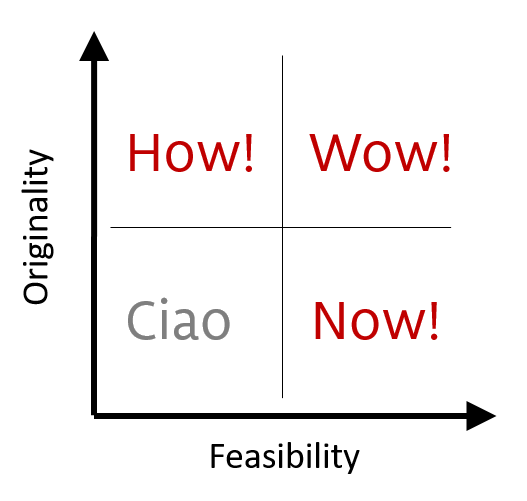# Ideate
# How-Wow-Now Matrix
- Purpose
- Evaluation according to feasibility and innovation
- Time required
- 10 to 40 minutes
- Participants
- Design Thinking team
- Level of experience
- Beginner

# What is it about?
This method helps to evaluate ideas collected in advance according to their feasibility and originality. The method can be used both for your own evaluation process and democratically in a team.
# The goal
The aim of this method is to evaluate the collected ideas in a structured way and to determine how to proceed with them.
# How to do it?
- Draw a 2x2 matrix as shown in the figure. The Y-axis refers to the originality, while the X-axis represents the feasibility.
- Mark the squares as Now, How and Wow.
- If the method is used by the whole team, vote democratically and assign the available ideas to the individual squares.
- Look at or discuss the result in the team. "Now" ideas should be implemented directly or kept as a reserve. "How" ideas should be further elaborated in order to find a way to implement them. "Wow" ideas should be tackled immediately and the necessary steps should be discussed. Ideas that do not fit into one of these three squares can be discarded.
# When do you need it?
The method is suitable following the divergent idea-finding phase. It is used when there is a large pool of ideas to be structured and preselected. During the implementation, existing ideas can also be combined or summarized in the discussion.
# Resources
- Flipchart
- Markers
- Large stickers
- Template for How-Wow-Now Matrix
# Advantages
This method offers good criteria for the pre-selection and classification of ideas into different evaluation groups.
# Disadvantages
If the method is carried out in a team, different ratings can lead to long discussions. Participants may tend to defend their own ideas. A moderator is helpful here.
# Keep in mind
An evaluation of feasibility and originality is never completely objective, but it does not have to be. The specific conditions of the project should be taken into account.
# See also
| Previous methods | Alternative methods | Following methods |